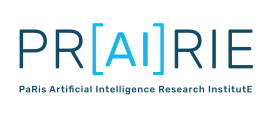Learning System Dynamics from Sensory Input under Optimal Control Principles
Résumé
Identifying the underlying dynamics of actuated physical systems from sensory input is of high interest in control, robotics, and engineering in general. In the context of control problems, existing approaches decouple the construction of the feature space where the dynamics identification process occurs from the target control tasks, potentially leading to a
mismatch between feature and state spaces: the systems may not
be controllable in feature space, and synthesized controls may
not be applicable in state space. Borrowing from the Koopman formalism, we propose instead to learn an embedding of both the states and controls into a feature space where the dynamics are linear, and include the target control task in the learning objective in the form of a differentiable and robust optimal control problem. We validate the proposed approach with
simulation experiments using systems with non-linear dynamics, demonstrating that the controls obtained in feature space can be used to drive the corresponding physical systems and that the learned model can serve for future state prediction.
Domaines
Informatique [cs]| Origine | Fichiers produits par l'(les) auteur(s) |
|---|


